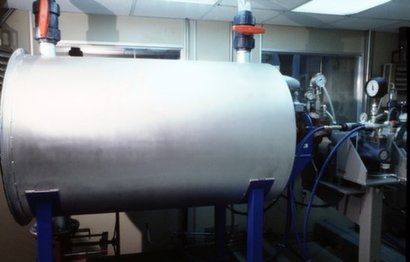
Dr Mark Walker, Research Associate from the University’s Energy 2050 research institute, has collaborated with UK and Indian partners to install a sustainable system from biological waste and novel solar photovoltaic technology for a West Bengal village. The system is designed to provide basic electrical energy needs to a community and has the additional benefit of providing biogas for cooking. This could improve the quality of life for women who often have to cook with dirty smoking fuel in enclosed houses.
The project, funded by RCUK Energy, RCUK Digital Economy and the Indian Department of Science and Technology, involved a multinational team, including the Universities of Exeter, Nottingham, Leeds and Herriot-Watt in the UK, and IIT Madras and Bombay and Visva Bharati University in India, to develop the integrated technology in Pearson Pally, which they then trained local people to use and maintain.
“More than 400 million people in India currently have little or no electricity” said Dr Walker, who has led on the biogas system. “The villagers in this part of the world are employed clearing local lakes and woodlands of weeds and other plant material. This, along with locally collected food waste, is perfect raw material for anaerobic digestion, a technology that is being increasingly used throughout India.”
Sukanya Kumar-Sinha, Acting Director of RCUK India, added that the project is funded under RCUK’s Bridging the Urban-Rural Divide programme, and that a recent visit to the project site revealed how the rural access to reliable electricity is not only improving daily lives but also enhanced facilities for education and health.
One unique aspect of the project is that it looks to integrate several renewable energy technologies - with no fossil fuel backup - to produce electricity at a small scale. Most other projects have focused on a single source of renewable energy (mostly solar) and some form of energy storage (e.g. batteries) and then a fossil fuel (e.g. diesel) generator for backup.
The second major development is the use of biogas (from anaerobic digestion) for rural electrification in the developing world. Previously, biogas programmes have focused solely on using the gas for cooking. Dr Walker said that the challenge has been to make these systems more effective and to integrate them into an electrical energy system. Achieving this involves process modelling so the system can be designed to cope with sudden changes in demand.
The system is designed to produce 14 cubic metres of biogas per day and can provide 65 kWh of electricity per day. The power is now being used to satisfy the domestic needs of villagers, but also provide lighting for streets and communal areas, as well as power to a local medical centre and school.
The team aim to continue the project with the help of industrial partners. These developments could lead to improvements in the provision of low-carbon electricity in developing countries, which in turn could contribute to poverty reduction and increase healthcare, educational and employment prospects for some of the poorest people in the world.
The growth of biogas and anaerobic digestion technologies has been supported by the announcement of the World Biogas Association (WBA). Launched at the United Nations Convention on Climate Change COP22 in Morocco, the WBA is dedicated to maximising the contribution of these technologies to commitments in the Paris Agreement. This work links to the UN’s Sustainable Development Goal of ‘Sustainable Access for All’. A team from the University of Sheffield were at ‘COP22’ in Marrakech last week to share their knowledge and expertise in the area of energy technology.
The research forms just part of the University’s ongoing collaborative work with India. This previously included research to tackle corneal infections by developing a new technology to aid in rapid diagnosis and treatments to reduce the number of patients losing their eyesight.
This month, the University’s Vice Chancellor and Deputy Vice Chancellor joined a ministerial delegation to India to further develop the University’s partnerships and highlight the University’s #WeAreInternational campaign, aimed at celebrating the benefits of an international higher education sector in the UK.
For additional information:

